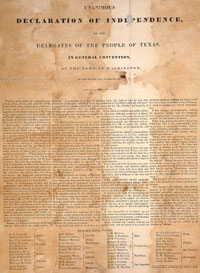1836 – Texas Revolution: The Declaration of independence of the Republic of Texas from Mexico is adopted. The Texas Declaration of Independence, adopted on March 2, 1836 at the Convention of 1836 in Washington-on-the-Brazos, formally declared Texas's independence from Mexico during the Texas Revolution. It was signed by delegates the following day after corrections were made to the text. In October 1835, native Tejanos and new settlers in Mexican Texas launched the Texas Revolution. However, amongst the people of Texas, many struggled with understanding what the ultimate goal of the Revolution was. Some believed that the main goal should be total independence from Mexico, while others sought for a reimplementation of the Mexican Constitution of 1824 which had included freedoms, such as the treatment of slaves as property, that were not in the 1835 constitution of Mexico, Siete Leyes. (Seven Laws) To find a compromise, a convention was called for in March 1 of 1836. This convention differed from the previous Texas councils of 1832, 1833, and the 1835 Consultation. Many delegates were young U.S. citizens who had recently arrived in Texas, by violating Mexico’s April 1830 immigration ban. Moreover, many of them had fought in battles during the Texas Revolution against Mexico in 1835. Of the 60 signers, only two were native Texans, Jose Francisco Ruiz and Jose Antonio Navarro. Most of the delegates were members of the War Party and were adamant that Texas must declare its independence from Mexico. The convention was convened on March 1 with Richard Ellis as president. The delegates selected a committee of five to draft a declaration of independence; this committee was led by George Childress along with Edward Conrad, James Gaines, Bailey Hardeman, and Collin McKinney. The committee submitted its draft within a mere 24 hours, and this led historians to speculate that Childress had written much of it before he arrived at the Convention. The document closely mirrors the United States Declaration of Independence in both structure and tone. The declaration was approved on March 2 with no debate. Based primarily on the writings of John Locke and Thomas Jefferson, the declaration proclaimed that the Mexican government "ceased to protect the lives, liberty, and property of the people, from whom its legitimate powers are derived" and alleged that it committed "arbitrary acts of oppression and tyranny." The declaration officially established the Republic of Texas, although it was not officially recognized at that time by any government other than itself. The Mexican Republic still claimed the land and considered the delegates to be invaders, and the United States didn't recognize it since that would be an act of war against Mexico. The declaration's adoption was followed by the Battle of the Alamo and ultimately the decisive Texian victory at the Battle of San Jacinto in April 1836.
























